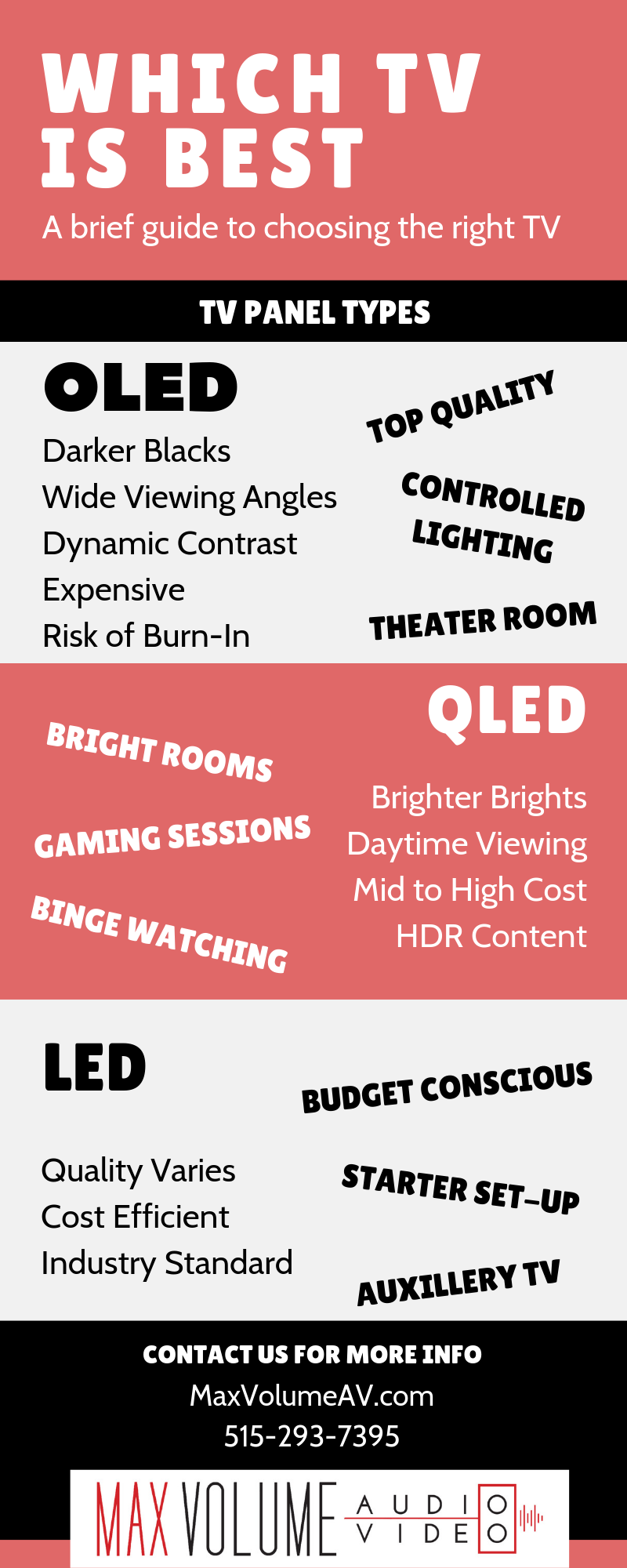This is a question we get quite often and unfortunately the answer isn’t a simple one. There is not one TV that is the “best”. Our recommendations are going to change depending on your needs. The main factors that we will consider when helping you choose a TV are what content the TV will be used for (movies, games, sports), the qualities of the room that it’s in (brightness, shape, general size), and your budget. Our goal with this blog is to help lead you in the right direction, but for more specifics you can always contact us for a consultation to find the exact right fit for your project.
Max Volume A/V LED TV Mount 2018
Let’s start with learning a little about how TVs work. An important part of TV technology is using different methods to light up pixels to create an image. Some of these methods are better for certain things than others (darkness levels, motion processing, off-axis viewing, etc.). The type of screen that’s best for watching high speed sports isn’t necessarily the best screen for HDR movies. Right now there are three basic types of TV screens/panels:
OLED TVs
Pioneered by the brand LG, OLED is the absolute best panel type for most uses. By lighting up each individual pixel, these TVs have exceptional black levels for truly immersive dynamic images, superb motion handling, wide viewing angles, and very low input lag for gaming. These are truly some of the best TVs produced by LG & Sony but they aren’t without their drawbacks. OLED TVs can be prone to something called “burn in”, also known as a “ghost image”. This causes permanent panel staining if static images are left long enough (think channel logos or if an image is paused for extended periods of time). The newer models of these TVs have shown significant improvement in this area. OLEDs also aren’t the brightest TVs, compared to QLEDs they have approximately half the maximum brightness. The last con we’ll talk about with OLEDs is that their price tends to be high compared to other TV types. If budget isn’t a concern, though, OLEDs are going to be the best choice in most situations.
QLED TVs
This technology, developed by Samsung, excels in some of the areas that OLEDs lack. Their pixels are not lit individually, but instead by a backlight system working in zones. This eliminates the burn in issue while still maintaining decent black levels and dynamics. Generally QLED technology can be found a bit cheaper than OLED, but are typically more expensive than an LED. The main reason to choose a QLED, though, is that they get very, very bright. They are going to be your best option for bright, daytime viewing environments. This is especially apparent when viewing HDR content.
LED TVs
LED is a broad description of screens that use a certain type of technology (Light Emitting Diodes) to light its pixels. This technology is the current industry standard and is the most common screen type (most phones and tablets have an LED screen). All TV manufacturers make an LED TV but even though they are all the same panel type, there are many differences in how they work. Some use zone backlighting, or FALD (Full Array Local Dimming), which allows them to have better black levels. This will make dark scenes in movies and shows more dynamic. Others have more advanced motion processing for improved sports viewing. LED pricing and quality can vary widely. Some LEDs are the cheapest TVs on the market and others are significantly more expensive. If you’re working with a smaller budget, LEDs are going to be the first place to look. A good mid-range LED can be just as good or better than a QLED for a lot of projects.
Any one of these screen types could be the “best” TV for your project, it just depends on your needs and budget. While deciding which screen type is best is a great start for choosing a TV, there are a lot of other factors to consider as well. Contact us for more specific recommendations, TV pricing, or for an in-home consultation.
Have more questions about TVs? Contact Us
Want to learn more about how to make your system the best it can be?
Check Out Our Other Blog Posts


